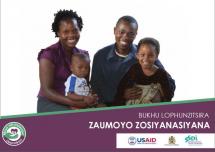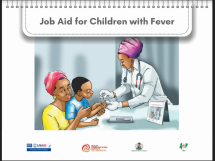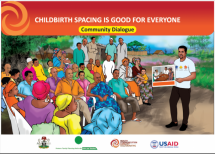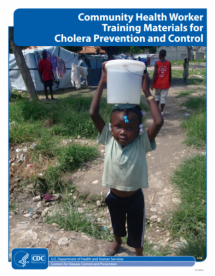Malawi – Moyo ndi Mpamba Campaign Community Health Worker Flipchart
This Community Health Worker Flipchart is an integrated SBCC support material that contains cue cards and corresponding content on SSDI-Communication’s six focal health areas that aligned with the messages included in the Family Health Booklet. The flipchart is simple and easy to use, even for low-literate audiences. SSDI-Communication developed flipchart in close collaboration with the Ministry of Health for SSDI-Services and Ministry of Health community volunteers to use as a reference during community and household outreach activities.
Over 12,000 Community Health Worker Flipcharts reached communities in Malawi in 13 districts. SSDI-Communication oriented over 8,000 community health workers and volunteers on how to use it to support families to adopt healthy behaviors. Anecdotal reports indicate that the Flipchart has filled a gap in basic health information at a literacy level appropriate for audiences in rural areas.
SSDI-Communication supported the Ministry of Health in realizing its ambitious health promotion agenda by developing and running a multimedia, multi-level Moyo ndi Mpamba, Usamalireni (“Life is precious, take care of it”) campaign, from 2011-2016. The ultimate goal of this campaign was to promote positive health behaviors and create demand for available services across six focus health areas – HIV & AIDS; family planning; nutrition; maternal, neonatal and child health; malaria; and water, sanitation and hygiene – and with audiences across the socio-ecological landscape and all targeted life stages.
Source: SSDI-Communication
Date of Publication: March 25, 2019
SIMILIAR RESOURCES
Tools
Examples
- Family Planning Counselling Kit
- Coronavirus Disease Overview
- GESI Toolkit
- Zika and Pregnancy: Questions and Answers
- Grassroot Soccer SKILLZ COVID-19 Response Curriculum
- Interpersonal Communication for Immunization (IPC-I)
- The Infection Control Symbol Package
- WASH FIT / WASH FIT Mobile
- Hand Hygiene: Why, How & When?
- Hand Hygiene: Why, How & When?









